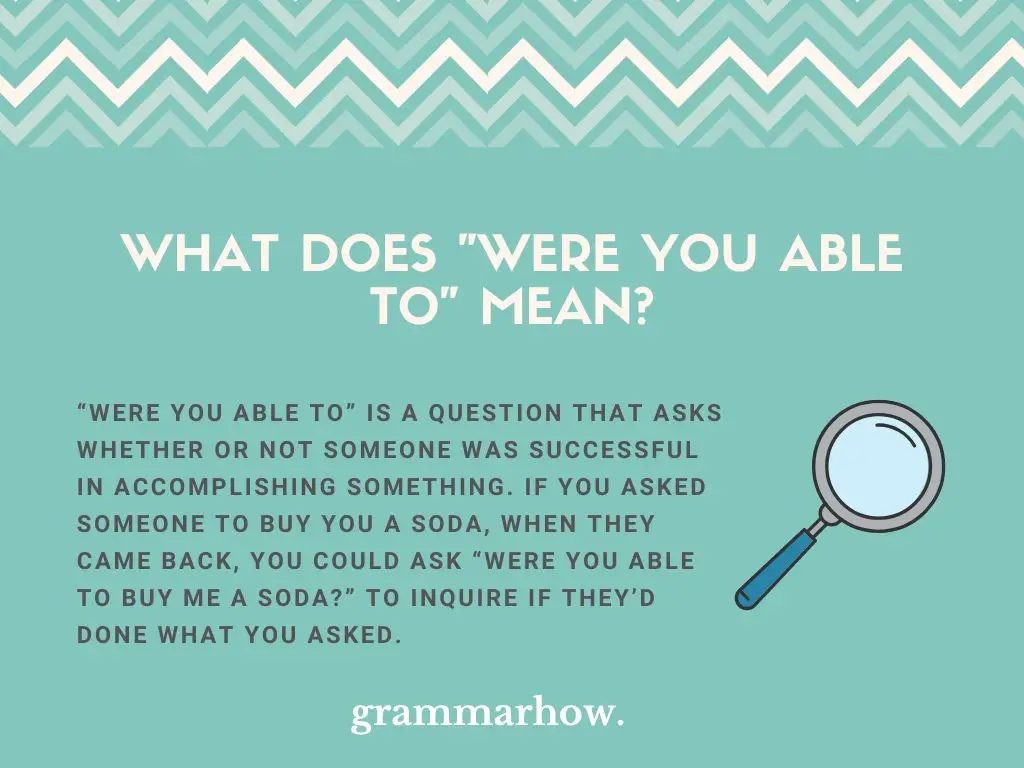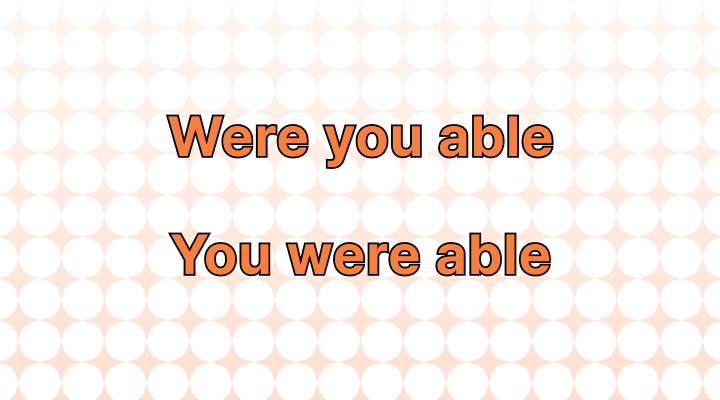- Were You Able: This phrase is structured as a question. It inquires about someone's ability or success in a particular task or situation. It often appears at the beginning of a sentence.
- You Were Able: This phrase is a declarative statement. It affirms that the person being addressed was capable of accomplishing something and typically occurs as a statement within a sentence.
What is the Difference: "Were You Able" vs. "You Were Able"
The key difference between these two phrases lies in their word order, and purpose of the phrase.
Were You Able
Use this phrase when you want to ask someone if they had the capability or success in a specific situation.
In the sentence "Were you able to complete the project on time?" the phrase "were you able" is used to pose a question about someone's capability or success in achieving a specific task. It is asking whether or not the person had the necessary skills, resources, or circumstances to finish the project within the designated time frame.
More example sentences
- Were you able to complete the project on time?
- Were you able to find the information you needed in the library?
- Were you able to attend the conference last week?
- Were you able to reach your sales target for the quarter?
- Were you able to fix the computer issue?
- Were you able to secure a reservation for dinner tonight?
- Were you able to solve the math problem I gave you?
- Were you able to locate your lost keys?
- Were you able to convince them to change their minds?
- Were you able to meet with the client to discuss the proposal?
Examples from the web
"Were you able to verify all of the sources?" - The New York Times
"Were you able to shoot the film in sequence?" - The Guardian - Film
"At what point were you able to come completely clean?" - The New Yorker
You Were Able
Employ "You Were Able" when you want to acknowledge and affirm someone's capability or success.
In the sentence "You were able to find a solution to the problem," the phrase "you were able" is used to convey the idea that the person, the subject of the sentence, had the capability or capacity to do something, in this case, to find a solution to the problem. It indicates that the person possessed the necessary skills, knowledge, or resources to achieve the task of finding a solution.
More example sentences
- You were able to finish the marathon in under three hours—impressive!
- Despite the challenges, you were able to successfully complete the puzzle.
- You were able to fix the broken down car with just a few tools.
- Thanks to your hard work, you were able to secure the promotion at work.
- You were able to convince the team to support your innovative idea.
- Even with limited resources, you were able to cook a delicious meal.
- You were able to complete the assignment well ahead of the deadline.
- Despite the weather conditions, you were able to reach the summit of the mountain.
- You were able to negotiate a great deal on the purchase of your new home.
- With determination and practice, you were able to master the piano.
"You were able to disagree without causing anything emotionally." - The New York Times - Sports
"You were able to get your hair cut, see a dentist and a doctor". - BBC
You were able to buy their bond between 20 to 30% yield to maturities. - Forbes
To distinguish these phrases, think of "Were You Able" as a question, initiating a query about someone's ability, and "You Were Able" as a statement, confirming their capability.
Synonyms
- Could You: An alternative way to ask about someone's ability or success.
- "Could you please assist me with this heavy box? I could use an extra pair of hands."
- Managed To: A synonym for "were able to" when discussing accomplishments.
- She managed to complete the project ahead of the deadline, impressing her colleagues with her efficiency and dedication.
Antonyms
- The antonym for "Were you able?" would be "Were you unable?"
- Were you unable to attend the meeting due to a prior commitment?
- For "You were able," the antonym would be "You were unable."
- You were unable to unlock the door because you had misplaced the key.
Common Idioms:
- Come Through: An idiomatic expression that means to succeed or accomplish a task.
- Rise to the Occasion: An idiom used to describe someone's ability to perform well under challenging circumstances.
Summary
In summary, "Were You Able" is a question that inquires about someone's ability or success, while "You Were Able" is a statement that affirms their capability or success. Understanding the difference between these phrases will help you use them appropriately in your conversations and writing, ensuring clear and effective communication.
Want to sound like a native speaker?
Engram’s AI-powered grammar checker makes your English sound like a native speaker’s, suggesting natural English expressions on top of fixing grammar, spelling, punctuation, word order, and vocabulary.

References:














